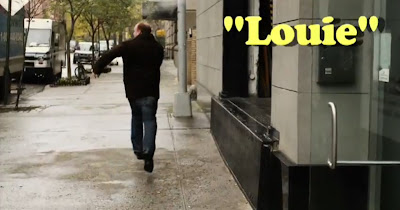Louie, Luckily

If you’ve watched television comedy in the last 15 years, you’ve seen the work of Louis C.K. In addition to writing for The Dana Carvey Show (most notably, the program’s very first sketch, which allegedly drove it straight to cancellation), The Chris Rock Show, Late Show with David Letterman, Saturday Night Live, and Late Night with Conan O’Brien, C.K. is widely regarded as one of the top stand-up comedians working today. In between stand-up specials and onscreen roles in The Invention of Lying and Parks and Recreation, the comedian has been courted by the major broadcast networks to develop his own half-hour sitcom. C.K. turned down the bigger-money offers and went to FX instead; the first two episodes of his new show, Louie, premiered on Tuesday night.
This isn’t C.K.’s first starring role on television, though. In 2006 HBO ignominiously made Lucky Louie, a multi-camera, live studio audience parody of/tribute to the ’70s Lear sitcoms, their first and only original series to be canceled mid-season. The network’s leadership fought with C.K. over how the show fit its brand of “quality,” a struggle exacerbated at the time by HBO’s inability to replenish its stock of not-TV-like programming that had defined it for much of the 2000s. Despite taking full advantage of HBO’s lack of restrictions on content, Lucky Louie just didn’t look right. It was so, well, TV:
While FX’s Louie retains much of the comedian’s mordant sensibility, its visual aesthetic and narrative structure are refreshing changes of pace for the half-hour format. Stand-up segments from C.K. provide interludes between vignettes that hew more closely to short films than to the A-plot/B-plot structure of sitcoms. The technique isn’t entirely new (Seinfeld tried something similar before abandoning Jerry’s stand-up bits altogether), but its use in Louie is indicative of a different industrial moment. C.K. took far less money up front from FX than he would have gotten from NBC or Fox so that he could maintain more control. The resultant product feels like it comes from a much more personal place than a writers’ room tasked with shoehorning the stand-up’s persona into the jolly patriarch mold AND penning sassy quips for his kids. To hear C.K. tell it:
“[FX President John] Landgraf is a very smart guy that he’s willing to do that. He has, whatever, $10 million to develop with. He’d rather break it into little pieces and try with a bunch of different people and let them do whatever they want and see which monkey with a typewriter comes up with a good show than to have this corporate science go into making two pilots that nobody wants to watch.”
Would Louie have worked better for HBO in 2006? The program is certainly more akin to the single-camera docu-coms that have recently reigned as critical darlings than it is to the much-maligned multi-camera sitcoms, but so what? As Michael Z. Newman notes, single-camera sitcoms are positioned discursively as “quality” against “primitive” multi-camera ones, a relationship that relies on hoary progress narratives. Louie doesn’t represent another step towards the ultimate sitcom; instead, it adds to what Christine Becker calls “a range of available choices” in sitcom aesthetics. We might think of Louie’s ebb and flow of stand-up to sketch-like segment as yet another possibility for a genre that has proven itself to be both dynamic and resilient over the years. It’s comedian comedy for the post-network era.



Great look at what is really an intriguing series: I don’t find it as hilarious as others, but it’s so structurally interesting that I couldn’t possibly turn away.
I think my favourite thing about it is that Louis C.K. edits the show himself. It’s one thing to create/write/direct/produce, it’s another to edit the darn thing. It doesn’t get much more personal than that.